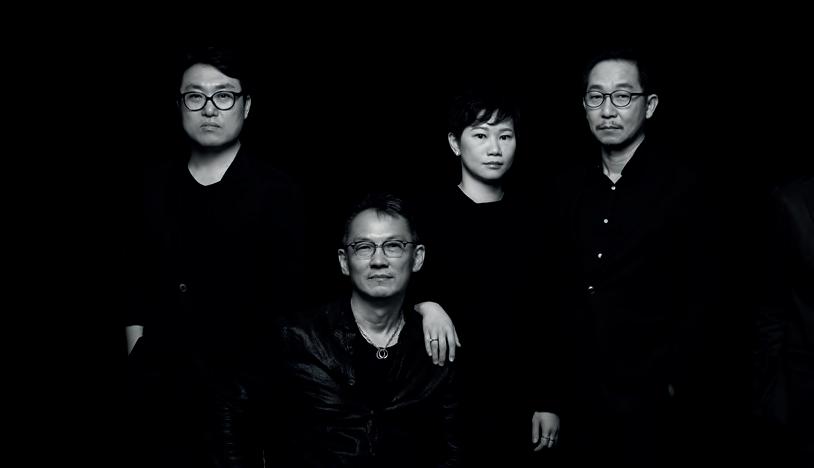
7 minute read
Jury President: Joan CHEN
Joan CHEN 陳 沖
One of the most iconic Asian actresses in world cinema, Joan CHEN made her film debut at the age of 14 in XIE Jin’s Youth (1977). She won Best Actress at the 3rd Hundred Flowers Awards for her performance in Little Flower (1980), only her second film. CHEN later moved to the United States to study at California State University, Northridge. During her time in the US, she landed a small role in Wayne WANG's Dim Sum (1985) and a starring role in Tai-Pan (1986). After her performance as Empress Wanrong in Bernardo BERTOLUCCI’s The Last Emperor (1987) put her in the global spotlight, CHEN also wowed audiences around the world as Josie Packard in David LYNCH's Twin Peaks (1990). In 1993, she returned to Chinese-language cinema with an audacious performance in Clara LAW's Temptation of a Monk. CHEN’s performance in Stanley KWAN’s Red Rose, White Rose (1994) earned the actress her first Golden Horse Award for Best Actress. In 1998, CHEN made her first foray into directing with Xiu Xiu: The Sent Down Girl. The film won seven Golden Horse awards, including Best Screenplay, Best Director and Best Film. In 2007, she won both the Golden Horse Award and the Australian Film Institute Award for Best Actress for Australian drama The Home Song Stories . In the same year, she won the Asian Film Award for Best Supporting Actress for JIANG Wen’s The Sun Also Rises. CHEN returns to the director’s chair this year with Chinese-language film English.
Advertisement
當代影壇最具代表性的亞洲女演員陳沖,十四歲時初登銀幕,主演謝晉的《青春》( 1 9 7 7 )。接著主演第 二部電影《小花》( 1 9 8 0 ),即榮獲第三屆百花獎最佳女主角。其後移居美國,在加州州立大學北嶺分校 深造。在美國期間曾參演王穎導演的《點心》( 1 9 8 5 )及主演冒險大製作《大班》( 1 9 8 6 )等影片。她接著在 貝托魯奇的《末代皇帝》( 1 9 8 7 )中飾演皇后婉容,因表現出色備受國際影壇注目;在大衛連治的電視劇 《 迷 離 劫 》( 1 9 9 0 ) 中 的 演 出 亦 讓 全 球 觀 眾 讚 歎。1 9 9 3 年 她 回 歸 華 語 影 壇,主 演 羅 卓 瑤 執 導 的《 誘 僧 》,憑 大 膽 出 色 的 演 技 令 觀 眾 留 下 深 刻 印 象;其 後 在 關 錦 鵬 的《 紅 玫 瑰 與 白 玫 瑰 》( 1 9 9 4 ) 中 以 優 秀 表 現 首 奪 金 馬 獎 最 佳 女 主 角 殊 榮。1 9 9 8 年 首 次 執 導 電 影《 天 浴 》 即 奪 得 金 馬 獎 最 佳 編 劇、最 佳 導 演 及 最 佳 電 影 等 七 項 大 獎。2 0 0 7 年 主 演 澳 洲 電 影《 意 》 獲 金 馬 獎 最 及 澳 洲 電 影 學 院 大 獎 最 佳 女 主 角。同 年 主 演 姜 文 執 導 的《 太 陽 照 常 升 起 》獲 第 二 屆 亞 洲 電 影 大 獎 最 佳 女 配 角。她 今 年 再 執 導 筒,最 新 作 品 為 華 語 電 影《 英 格 力 士 》。
INTERVIEW 訪 問
As the Jury President of AFA13, what criteria will your jury have when picking the winners? And what do you think is unique about the AFA?
When I serve as a jury member at a film festival, I look for films that can move me, offer me something new, excite me, inspire me and break existing barriers. Having the intuition for that is the most important thing to have as a viewer.
As for the Asian Film Awards, I look forward to discovering stories from around the region, because they’ll be different from those from Europe and North America. Many film festivals are centred around European and American traditions, so we should seek out stories from other places. Film has a way of attracting people into new realms, showing them different lives, people and stories. I hope to see things that I haven’t seen before.
As an international filmmaker, how do you see the future of Asian Cinema?
I believe that the global audience have been paying more attention to Chinese and Asian cultures mainly due to geopolitics. As for art, even South Korea’s Burning (2018) and Japan’s Shoplifters (2018) were released in arthouse cinemas in the US because there is still an audience for them. It didn’t seem so long ago that China’s Fifth Generation directors had just begun to bring their films overseas, when those films seemed so hip and fresh at the time. That’s not the case anymore; audiences now appreciate Asian films as films rather than as hot commodities. Global audiences need films like this to make them see that humanity is universal. I believe many things that humanity will face in the future transcend national borders.
What are your thoughts about film restoration?
There are a countless number of films produced every year, but only few of them are truly great. I think those great films should be preserved for a long time, like putting them in a time capsule. Restoring old films, such as BERTOLUCCI’s The Last Emperor (1987), actually make them new again because it gives young people the chance to see the colours of those eras and the way people moved within them.
PHOTO BY KAON

What has motivated you to keep working in films?
Making movies is fun. It’s an amazing thing that has saved me many times. I didn’t start out wanting to make movies; my school chose me for it. I never dreamt of doing it. If I’m a young person now, there’s a chance that I wouldn’t be making movies. I never had that motivation, nor did I feel that I was particularly suited for it. Nevertheless, I was tasked to do it, and I eventually found it to be a good way to express myself. I’m an introvert who doesn’t like to express my emotions. Film saved me; it gave me a chance to express myself. Even being in a cinema allows me to relax and openly experience emotions. I’m actually quite reserved when I’m with people, so film not only gave me a medium of expression; it also gave me a way to enjoy others’ expression of emotions. That’s why I think film is an amazing thing.I’m an introvert who doesn’t like to express my emotions. Film saved me; it gave me a chance to express myself. Even being in a cinema allows me to relax and openly experience emotions. I’m actually quite reserved when I’m with people, so film not only gave me a medium of expression; it also gave me a way to enjoy others’ expression of emotions. That’s why I think film is an amazing thing.
Which do you enjoy more – directing or acting?
I like both. Directing is a little more tiring because it’s an all-encompassing job even though it gives me a chance to express more things. Actually, I’ve come to enjoy acting more since I became a director. First of all, it made me more understanding of my directors. Secondly, it gave me a better idea of what my characters should contribute to stories and their place within them.
What advice do you have for young filmmakers?
I don’t believe in offering advice or warning. Young people don’t need older people to advise them – they should just be themselves. If you have something you truly want to make, then it must be a dream of yours. In that case, you should make it in a film language that you like the most. No matter how you tell a story, it’ll find an audience. Every filmmaker can only make what he or she likes. You can say that only certain kinds of stories can attract an audience, but if you don’t feel anything for a story, then it’s not going to be good. You can’t make something to pander to a certain group of audience; you have to like what you’re making first.
The world will always confuse you and stop you from being yourself. I think the only way to success is to do what you think is best.
無論在哪一個電影節當評審,我都會挑選一些動人的電影,或者具有創意,有某種令我感到興奮、能夠啟 發我的東西。這份觀影的直覺很重要。 對於亞洲電影大獎,我期待去發現更多在亞洲地區所發生的故事,因為這跟歐美的故事不同。許多電影 節都聚焦於歐美電影上,所以我們應該發掘其他地方的電影。電影本能將觀眾帶進新的領域,讓他們了 解不同地方的故事和風土人情,我希望見到一些前所未見的事物。
作為國際電影人,你對亞洲電影的未來有何看法?
我認為由於地緣政治的關係,全球觀眾對中國和亞洲文化有更大的興趣。例如韓國電影《燒失樂園》 (2018 )和日本的《小偷家族》(2018 )等電影,也會在美國的藝術影院內上映,而且有不少觀眾捧場。當年 中國第五代導演將他們的作品帶到海外時,觀眾都覺得非常新鮮,當作一種潮流。現在不同了,觀眾將亞 洲電影視為電影,而非一件熱門商品。世界各地的觀眾可藉著電影來感受人性共通之處。我認為人類將 來面對的事情是超越國界的。
你對修復電影有什麼看法?
每年都有無數的電影製作,但是出類拔萃的可能寥寥可數,這些精品應該被妥善保存,有如放入時間囊 內。將貝托魯奇的《末代皇帝》(1987 )修復後,它又變成一部新電影了。年輕人可以藉此看到那個時代的 色彩與演出。
有什麼令你對電影的熱情保持不變?
我覺得拍電影很好玩。電影是很神奇的東西,多次挽救了我。我並非自願去拍電影,是學校將我選出來 的,我做夢都沒有想到要拍電影。如果我現在是個年輕人,可能不會拍電影了,因為我沒有這種動力,也 不覺得合適。但被選中後,我透過工作發現這是表達自己的大好機會。我性格內向,不喜歡表露自己的情 感,所以其實電影拯救了我,給我一個表達自己的機會。我在看電影的時候,可以很放鬆的去感受其中 的情感,反而在人前卻羞於表達自己的感受。電影不但是我表達自己的工具,也讓我體驗別人表達情感, 我覺得電影很神奇。
你喜歡當導演還是演員?
兩樣我都很喜歡,做導演要兼顧各方面,因此較為吃力,不過卻有機會表達更多東西。做過導演以後再做 回演員,我對表演會更加享受。首先會懂得體諒導演。其次,我會更清楚角色在戲內位置和作用。
對年輕電影人有什麼忠告?
我覺得沒有必要給別人忠告,年輕人不需要年長的人給他們忠告,他們做自己就夠了。如果你很想將某 些東西拍出來,那就將之當作你的夢想,要以自己最喜歡的方式把它拍出來。不管你怎樣講這個故事,都 會有觀眾的。每個電影人都只能拍自己喜歡的東西,若能將自己喜歡的東西拍出來,一定會有觀眾的;如 果你對題材沒有感受的話,一定不會拍得好,觀眾也不會喜歡。 這個世界有很多東西令人困惑,令人無法做自己,我覺得只要你做好自己,你就成功了。











